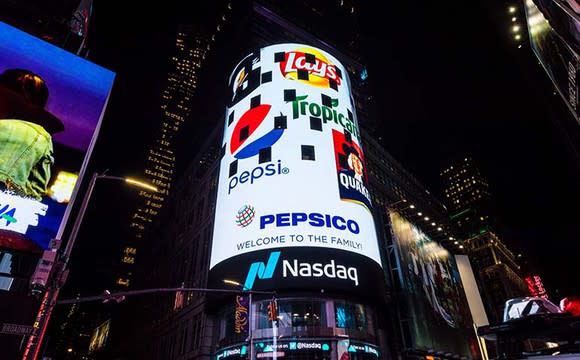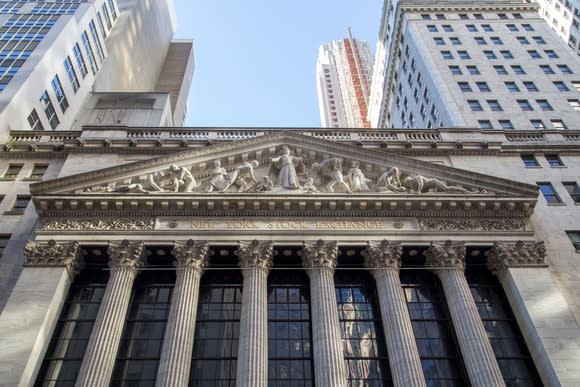What PepsiCo's Move From NYSE to Nasdaq Means for Investors
It's not such a rare event that a company switches its stock listing from one stock exchange to another, but when a company the size of PepsiCo (NYSE: PEP) decides to abandon its nearly 100 year listing for one on a rival exchange, it is something of a big deal.
While the exchanges poach each others' members all the time, Pepsi is the largest company ever to make a switch, with a market capitalization of nearly $170 billion. That just barely ekes out the value of Oracle (NYSE: ORCL) when it made the reverse switch from the Nasdaq to the NYSE in 2013.
The food and beverage giant says the reason behind it's jumping from the New York Stock Exchange to the Nasdaq exchange on Dec. 20 is that it will provide the company "with greater cost-effectiveness and access to Nasdaq's unique portfolio of tools and services to connect with our investors more efficiently."

Image source: Nasdaq.
Big fees for listing on the Big Board
Cost is one of the most cited reasons when companies leave the NYSE. It has a range of per-share fees that max out at $500,000 a year, while the Nasdaq exchange will be switching to a single, all-inclusive fee starting Jan. 1. While the fees are also based on the number of shares outstanding, they range from $45,000 for the smallest companies to $155,000 for the largest, a pretty big savings even for a company like Pepsi, with over $63 billion in annual sales.
Even so, many companies still see the prestige, visibility, and liquidity the NYSE offers as worth the cost. For example, mobile security software and handset maker BlackBerry (NYSE: BB) jumped from the Nasdaq to the NYSE in October. It has a $5.8 billion market cap and some 530 million shares outstanding, compared with Pepsi's market valuation of $172.7 billion and almost 1.5 billion shares outstanding.
Yet despite the NYSE's image as hosting the bluest of the blue-chip stocks, in recent years the hue has faded markedly. The five biggest corporations in the U.S. are now Nasdaq-listed companies: Apple, Alphabet, Microsoft, Amazon.com, and Facebook. Not till Berkshire Hathaway in sixth place do we get an NYSE-listed stock.

Image source: Getty Images.
The human touch
Although there are probably more similarities between the exchanges these days than differences, the contrast between them hinges on how orders are received and placed. The NYSE remains an auction market, almost as when the first trades were made under the buttonwood tree. It still relies on human floor traders and brokers to physically trade shares by comparing bid prices and ask prices, while the Nasdaq is a dealer's market, where brokers must either call the dealer or use the online execution system to enter a trade.
Computers, though, reign supreme on both bourses, and some critics question the value of what they view as the NYSE's antiquated system that they contend is more for show than anything else. Others see the mix of people and computers as the right balance. And there is something to be said of the pomp and drama of ringing the opening bell to mark the start of the trading day on the NYSE.
Bragging rights
Still, both exchanges have regularly sought to poach each other's listings, and each views it as a public-relations coup when a big name is snagged, such as when former Dow Jones Industrial Average component Kraft split the company into Kraft Foods and Mondelez and listed both on the Nasdaq. That was the first time a Dow component had left the NYSE.
Yet even the DJIA itself is no longer exclusively NYSE-only stocks: Cisco Systems, Intel, and Microsoft are now all included, as it became apparent technology is an integral part of the economy.
For its part, the NYSE viewed it as a win when digital companies such as Pandora Media and LinkedIn chose to IPO on its exchange, particularly as many companies, especially tech-related, often choose to go public on the Nasdaq.
Charles Schwab (NYSE: SCHW) is the only company to have switched from the NYSE to the Nasdaq and then switched back to the NYSE.

Image source: Getty Images.
Sit tight
So what does the switch by Pepsi mean for investors? Ultimately -- and fortunately -- not much. The brokerage companies handle the transaction seamlessly, and the number of shares an investor owns will not change. Not even the ticker symbol is going to change, as Pepsi will keep the PEP ticker on the Nasdaq.
Pepsi will be able to save some money, possibly several hundred thousand dollars' worth, and it says the change will enable it to better connect with shareholders. That may be the biggest and arguably the best change investors see.
More From The Motley Fool
6 Years Later, 6 Charts That Show How Far Apple, Inc. Has Come Since Steve Jobs' Passing
Why You're Smart to Buy Shopify Inc. (US) -- Despite Citron's Report
John Mackey, CEO of Whole Foods Market, an Amazon subsidiary, is a member of The Motley Fool's board of directors. Suzanne Frey, an executive at Alphabet, is a member of The Motley Fool's board of directors. Teresa Kersten, an employee of LinkedIn, a Microsoft subsidiary, is a member of The Motley Fool's board of directors. Rich Duprey has no position in any of the stocks mentioned. The Motley Fool owns shares of and recommends Alphabet (A shares), Alphabet (C shares), Amazon, Apple, Berkshire Hathaway (B shares), Facebook, and Pandora Media. The Motley Fool has the following options: long January 2020 $150 calls on Apple and short January 2020 $155 calls on Apple. The Motley Fool recommends Cisco Systems and Intel. The Motley Fool owns shares of Oracle. The Motley Fool has a disclosure policy.

 Yahoo Finance
Yahoo Finance 